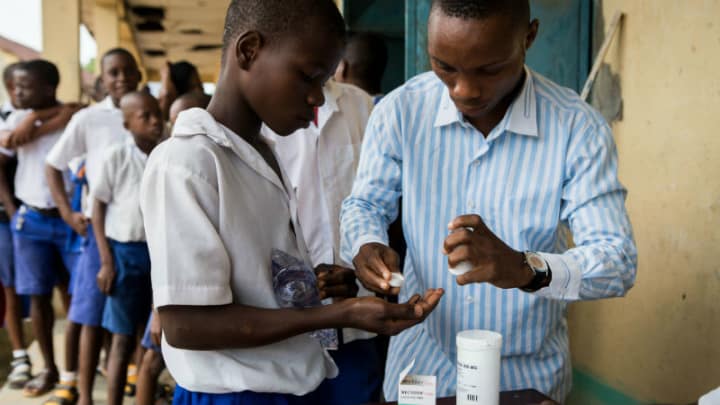A pupil receiving tablets for the prevention of intestinal worms.
The government has been urged to allocate more funds for activities aimed at eliminating Neglected Tropical Diseases (NTDs) from the country.
Stakeholders at the commemoration of the 2nd World Neglected Tropical Disease (NTD) Day, said the country continues to largely rely on foreign aid for its NTDs elimination activities.
NTDs are a group of ailments that threatens about 1.7 billion people living in the poorest and most marginalised communities globally.
These diseases cause blindness, disable or disfigure people and also affect the personal development of infected people.
In Ghana, 14 NTDs, including trachoma, intestinal worms, river blindness, bilharzia, elephantiasis, sleeping sickness, Buruli ulcer, leprosy, yaws, are being currently managed by respective Programmes under the Ghana Health Service (GHS).
Director General of the GHS, Dr Patrick Kuma-Aboagye speaking at the event held in Accra said NTDs caused significant morbidity and mortality globally.
“In Ghana, every district is endemic with at least two NTDs. Most of these diseases do not kill but produce debilitating effects, including severe disfigurement, disability, and blindness on patients,” he said.
Dr Kuma-Aboagye said the diseases frequently overlapped geographically due to their strong association with poverty, thus, people were often affected by more than one disease.
“Preventing and controlling NTDs is central to ending extreme poverty and interventions currently include preventive chemotherapy, case management health education, and awareness creation,” he said.
The Director-General said apart from NTDs condemning affected people to live long years with disability and stigma, they also kept children out of school, adults out of work; burdened households with considerable costs of seeking health care, trapped communities in endless cycles of poverty and cost developing economies billions of dollars every year.
He therefore called for inter-sectoral collaboration to maximize resources and enhance the efficiency of NTDs elimination interventions.
He noted that, for better integration of NTDs activities into the healthcare system, a primary health care approach was essential while maintaining close interaction between programmes to bring multiple health benefits to people in need.
Acting World Health Organisation (WHO) Country Representative, Dr Neema Rusibamayila Kimambo, in her remarks lauded Ghana for making progress in the control and elimination of the diseases despite the limited resources.
She said treating affected populations and populations at risk of NTDs was a key strategy for achieving the Sustainable Development Goal (SDG) three.
She said with its efforts to leave no one behind, the WHO in its 13th General Program of Work was aiming at reaching more than 1 billion people with essential curative and preventive packages for all communicable diseases including the NTDs.
The World NTDs day is celebrated on January 30th every year across the globe to create awareness about NTDs and mobilize greater attention, action, and investments on priority issues in countries that are directly affected.
This year’s celebration was themed, “Face NTDs and End the Neglect”.
By Jamila Akweley Okertchiri


